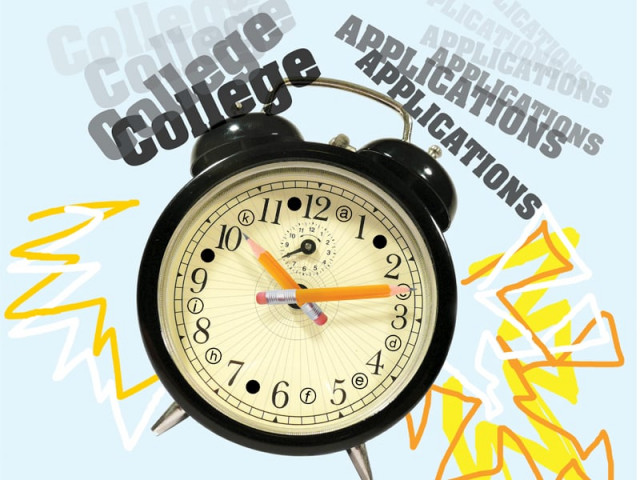College apps 101
College apps may seem tough, but with the right components and some luck, you can sail right through...

College apps 101
November and December of the final year of high school are perhaps the most stressful periods of a student’s life. Studying for the SAT and for the school’s mid-term examinations, filling out application forms, chasing teachers for letters of recommendation, fretting about college essays and personal statements, stocking up on extra-curricular activities consume most of these two months. Throw a few obligatory social appearances and additional tuitions into the mix and 24 hours in a day suddenly seem inadequate. Unfortunately, sometimes even a student’s best efforts may be trumped by a rather compassionless Fate and heartbreak and disappointment may follow. Ultimately, it’s best to acknowledge the presence of a certain amount of chance in the college admission process — but leaving everything to luck is only justifiable in Vegas. Here’s a rundown on the components of a college application:
Grades
These are single-handedly the most important part of your application. Of course, AS and O level results are most important here. In fact, they are pretty much what determine your chances of admission into UK universities. But your school results matter a lot too — especially if your destination of choice is somewhere in North America. Typically, colleges in the US and Canada ask for a school transcript which includes all your grades in the past four years. So it’s best if straight As in AS and O levels are complemented by sound grades in school. If there’s too much of a contrast between school grades and Cambridge results, it indicates to colleges that a candidate is definitely intelligent, but not dedicated enough. If there is such a discrepancy and there is a good reason behind it, it always helps to mention the reason in your application and have the reason corroborated by either a guidance counsellor or a teacher.
Unfortunately, grades are the part you can do the least about as a current applicant. So it’s best to be realistic while drawing up a college list; forget about past grades and focus on things that are under your control at the moment.
SAT (and other standardised tests)
Standardised tests are a nightmare. They require months of continuous preparation and the test itself is as much a test of ability and intelligence as it is of stamina and remaining calm under stress. The tests are a measure of your reading, writing and quantitative skills. These skills develop over a period of time through good reading habits, regular writing, by taking part in discussions and debates and by learning to use basic math and logic. Test preparation centres cannot — and the good ones will not claim to — increase your scores substantially in a short period of time. They can, however, provide helpful test-taking tips; familiarise a candidate with the layout of the test and coach proper time management skills which can increase your chances of doing well on the actual test.
The importance of the score varies considerably across universities. Colleges in the UK do not consider these tests at all, while American and Canadian colleges differ in the importance that they assign to scores. Ultimately, SAT scores are only one facet of an application. Very low scores are a deal-breaker for most universities and very high scores may count strongly in a candidate’s favour, but average scores need to be supplemented by other parts of the application.
Essays
Sadly oft-neglected, essays are a critical part of the application and the one thing that a candidate has complete control over with a few months remaining for the application deadline. Universities in the UK and most other parts of the world require a personal statement, which is essentially a summary of a candidate’s future goals, past achievements and reasons for choosing to apply to a certain college. Most universities are looking for a clear statement of purpose and a plan of action. The tone of the essay is very formal and the content is not unlike a cover letter.
In contrast, essays required by US universities are a chance for the candidate to express themselves. It is an opportunity for candidates to give the admissions committee an insight into the candidate’s mind. American universities want the essays to be a reflection of a candidate’s personality. Therefore, a good essay is exactly that: a self-portrait that reflects a candidate’s personality, thought processes and life experiences. It is never a good idea to bluff while writing essays since admission committees are quite adept at separating truths from lies since that is their job after all. It’s best to be yourself while writing such essays.
Letters of recommendation
Letters of recommendation should provide a testament to a candidate’s characteristics, achievements and potential. Usually, letters of recommendation are penned by counsellors and teachers, but letters from other individuals (e.g. employers, peers, etc) may be valuable if they provide additional depth to your application. Good letters of recommendation are customised for the application with a particular focus on the recommender’s interaction and experiences with the student. The letter should also clearly spell out the student’s intellectual ability.
It is more important that the recommender knows the candidate well as compared to the recommender’s rank in the school hierarchy. While it adds credibility if the recommender is the principal of a school, an ordinary recommendation from such an individual will do more harm than good. It is also preferred that the recommender have known the candidate during his final two years in high school.
Extra-curricular activities
While this aspect doesn’t matter for UK universities and matters to a small degree for Canadian universities, it is essential for application packages heading to colleges in the US. Most of these universities simply want to know that candidates have a life outside of school. Most also appreciate it if the candidate has spent some time helping the community. Otherwise, it is usually sufficient to be a part of the school team or take part in drama or manage clubs or organise events. It is really anything that adds new dimensions to a candidate’s personality. If a candidate is particularly gifted at and passionate about a particular hobby that he/she intends to continue with at college, then the candidate should include proof of his/her ability and mention the desire to continue with that hobby.
With proper time management and by planning well in advance, college applications are not a daunting task. There is an element of luck involved, but it is not difficult to maximise one’s chances of securing admission into a good university abroad.
Tanveer Kazmi is a certified guidance counsellor from the University of California, Los Angeles
Published in The Express Tribune, November 19th, 2011.



















COMMENTS
Comments are moderated and generally will be posted if they are on-topic and not abusive.
For more information, please see our Comments FAQ